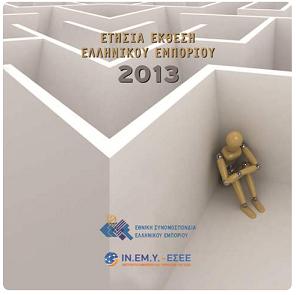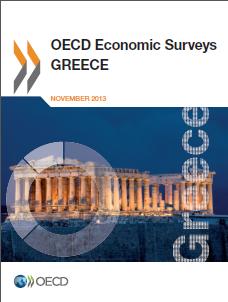Φιλίνης, Κ., (2013), “Τα τυπικά και τα άτυπα μονοπάτια εξάρτησης της ελληνικής αγοράς εργασίας”. Σε: Ελληνική Εταιρεία Πολιτικής Επιστήμης, Ελληνική Επιθεώρηση Πολιτικής Επιστήμης: Αφιέρωμα. Θεσμοί, Δημόσιες Πολιτικές και Μεταρρυθμίσεις στην Ελλάδα, Τεύχος 40, Ιούλιος. Από τις αρχές της δεκαετίας του ’90 έως το 2009, προωθήθηκαν οριακές μεταρρυθμίσεις στην ελληνική αγορά εργασίας, παρά τις ασθενείς επιδόσεις της, αλλά και τις πιέσεις για θεσμική αλλαγή που προκαλούσε η εξέλιξη της ευρωπαϊκής ενοποίησης, …Read More
Corruption Perceptions Index 2013
Transparency International, (2013), “Corruption Perceptions Index 2013”, Transparency International, Δεκέμβριος. The Corruption Perceptions Index 2013 serves as a reminder that the abuse of power, secret dealings and bribery continue to ravage societies around the world. The Index scores 177 countries and territories on a scale from 0 (highly corrupt) to 100 (very clean). No country has a perfect score, and two-thirds of countries score below 50. This indicates a serious, …Read More
Η Ελλάδα πρωταθλήτρια των μεταρρυθμίσεων στην Ευρωζώνη
Χρυσολωράς, Ν., (2013), “Η Ελλάδα πρωταθλήτρια των μεταρρυθμίσεων στην Ευρωζώνη”, Η Καθημερινή, 04 Δεκεμβρίου. Στο γενικό «σκορ» αναδεικνύεται η πλέον αποτελεσματική χώρα στη συνολική προσαρμογή της οικονομίας Για δεύτερη συνεχόμενη χρονιά η Ελλάδα αναδεικνύεται πρωταθλήτρια Ευρώπης στις μεταρρυθμίσεις, σύμφωνα με τη σχετική έκθεση της Δεξαμενής Σκέψης «Lisbon Council» που παρουσιάστηκε χθες στις Βρυξέλλες, παρουσία του αντιπροέδρου της Κομισιόν, Ολι Ρεν. Η έκθεση με τίτλο «Euro Plus Monitor» βαθμολογεί χώρες της …Read More
The Faux European Recovery and Youth Unemployment
Weeks, J., (2013), “The Faux European Recovery and Youth Unemployment”, Social Europe Journal, 03 December. Suddenly the media is a buzz with the prospect of a recovery in the euro zone. After four grim years of contracting GDP, unemployment and falling real wages, we read that country after country has turned the corner. Austerity worked and now we can reap the benefits. Before we become too overjoyed, it is worth …Read More
The 2013 Euro Plus Monitor: From Pain to Gain
Schmieding, H. and Schulz, C., (2013), “The 2013 Euro Plus Monitor: From Pain to Gain”, The Lisbon Council, Policy Brief, Volume III, No.1, December. If the eurozone and its 17 members stay the course, the systemic crisis that has rocked Europe since 2010 could be largely over by mid-2014. That is the principal conclusion of The 2013 Euro Plus Monitor: From Pain to Gain, the premiere competitiveness ranking published each …Read More
Ετήσια Έκθεση Ελληνικού Εμπορίου 2013
ΙΝΕΜΥ-ΕΣΕΕ, (2013), Ετήσια Έκθεση Ελληνικού Εμπορίου 2013, Αθήνα: ΙΝΕΜΥ-ΕΣΕΕ. Η Εθνική Συνομοσπονδία Ελληνικού Εμπορίου καθιέρωσε από το 2001 τη σύνταξη και δημοσιοποίηση της Ετήσιας Έκθεσης Ελληνικού Εμπορίου. Στόχος της πρωτοβουλίας αυτής είναι η σε τακτική βάση περιοδική ανανέωση της τεκμηρίωσης των εξελίξεων στο περιβάλλον μέσα στο οποίο λειτουργεί ο τομέας του εμπορίου, στα χαρακτηριστικά και στις οικονομικές επιδόσεις του και σε μια σειρά χρηματοοικονομικούς δείκτες των εμπορικών επιχειρήσεων. Η δομή …Read More
Greece Needs a Fresh Start
Hatzis, A., (2013), “Greece Needs a Fresh Start”, The New York Times, Room for Debate Column, 01 Δεκεμβρίου. During its tumultuous history modern Greece has always managed to be part of the winning alliances. Right after its independence Greece was attached to the powerful British Empire. In the two world wars Greece was an energetic ally of the western powers. After a ferocious civil war it saved itself from becoming …Read More
OECD Economic Surveys: Greece 2013
OECD, (2013), OECD Economic Surveys: Greece 2013, Paris: OECD Publishing. Greece, which has been under an internationally coordinated adjustment programme since 2010, has made impressive headway in cutting its fiscal deficit and implementing structural reforms to raise labour market flexibility and improve labour competitiveness. Shrinking domestic demand has also led to a substantial reduction of the current account deficit. Slow product market reforms held back price competitiveness and exports in …Read More
The Greek Budget Myth
Feldstein, M., (2013), “The Greek Budget Myth”, Project Syndicate, 27 Νοεμβρίου. Recently, newspaper headlines declared that Greece would have a balanced budget for 2013 as a whole. The news came as quite a shock: Recall that when Greek officials came clean about the true state of their country’s public finances in 2010, the budget deficit was more than 10% of GDP – a moment of statistical honesty that triggered the …Read More
The Greek paradox
Karamouzi, E., (2013), “The Greek paradox”. In LSE, The Crisis of EU Enlargement, London: LSE !deas. In recent years, Greece’s place in the EU has been ferociously debated as Athens’ financial and economic woes continue to trouble the stability of the euro and rattle the Eurozone markets. Contemporary press and European political elites alike engage in a seemingly endless blame game over the political origins of the Greek financial crisis. …Read More







